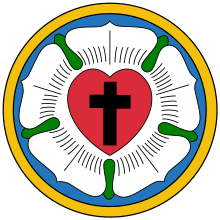American Association of Lutheran Churches
| American Association of Lutheran Churches | |
|---|---|
 | |
| Classification | Protestant |
| Polity | congregationalist polity |
| Origin | 1987 |
| Separated from | American Lutheran Church |
| Congregations | 67 (2014) |
| Members | 16,000 (2008) |
| Official website | www.taalc.org |
The American Association of Lutheran Churches (TAALC, also known as The AALC) is an American Lutheran church body. It was formed on November 7, 1987 as a continuation of the American Lutheran Church (ALC) denomination, the majority of which merged with two other Lutheran church bodies, the Lutheran Church in America (LCA) and the Association of Evangelical Lutheran Churches (AELC), to form the Evangelical Lutheran Church in America. The AALC offices were located in Bloomington, Minnesota. The national office moved to Fort Wayne, Indiana in 2007. It has 67 congregations, with about 16,000 members, in 2008.[1] Its current Presiding Pastor is the Rev. Dr. Curtis E. Leins.
Historical Background
The AALC began with 12 congregations and has, as of 2008, grown to 70 congregations spread across 23 states. The AALC sees itself as a confessional Lutheran Church body in the United States. At its beginning, TAALC defined itself by what it saw as maintaining a commitment to the authority of Holy Scripture and the teaching of the Lutheran confessions by way of retaining the Confession of Faith of the American Lutheran Church.
The AALC operates its own seminary, The American Lutheran Theological Seminary (ALTS), originally located in Saint Paul, Minnesota. In the fall of 2005, ALTS relocated to Fort Wayne, Indiana and is hosted by Concordia Theological Seminary of the Lutheran Church–Missouri Synod (LCMS).
The AALC holds to the inerrancy of scripture. It does not ordain women as pastors. However, women may serve as deaconesses. The AALC has two paths to ordination. Besides in congregations, its rostered pastors also serve as chaplains in the U.S. Armed Services, hospitals, correctional facilities, law enforcement, hospice, and a host of other specialized ministries.
Two AALC pastors are well known within confessional Lutheranism: Chris Rosebrough of Pirate Christian Radio and Jordan Cooper, who is an author, conference speaker, and host of the Just and Sinner podcasts. The AALC is also the denominational home of Trinity Lutheran Church of San Pedro, California, which was a key church in the Lutheran Renewal movement in the 60's under the leadership of the Rev. Larry Christensen.
Fellowship with the Lutheran Church–Missouri Synod
Since 1989 representatives of The AALC and the Lutheran Church–Missouri Synod (LCMS) have met in a series of official and unofficial talks. After six official meetings, at which various doctrinal papers were submitted, representatives of both The AALC and the LCMS have recommended to their respective church bodies that they enter into altar and pulpit fellowship with one another. The proposal was brought before theology/doctrine commissions of each church body before being presented at their respective national conventions. During the June 20–23, 2007 TAALC National Convention, the AALC declared fellowship with the LCMS; and voted to join the International Lutheran Council (ILC). On July 16, 2007, the LCMS declared fellowship with the AALC during the LCMS 63rd Regular Convention. The bonds between the two sister churches continue to grow and flourish.
Basic beliefs of the AALC
(from their Web site)
- Affirms the full authority of the Bible as the inerrant and infallible Word of God
- The Lutheran Confessions as a true interpretation of Scripture
- A purpose focused on the Great Commission with priority for Evangelism and World Missions
- The authority of the local congregation as the basic unit of the church
Presiding pastors
- Rev. Dr. Duane L. Lindberg 1987–1999
- Rev. Thomas V. Aadland 1999–2007
- Rev. Franklin E. Hays 2007–2014
- Rev. Dr. Curtis E. Leins 2014-
References
- ↑ "American Association of Lutheran Churches". Association of Religion Data Archives. Retrieved 22 February 2012.
